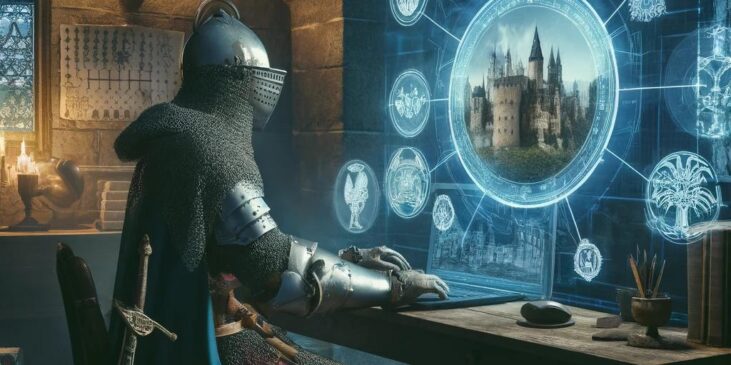Introduction to Digital Chivalry
Last updated 07/16/2023
Digital chivalry refers to the conceptual blending of medieval chivalric themes with contemporary digital technology. This fusion explores how elements such as dynasty, vassalage, and power dynamics, historically rooted in the Middle Ages, are represented and reimagined in digital formats, particularly within video games and online platforms. Digital chivalry extends beyond mere representation to influence modern interpretations of literary works, transforming traditional texts like Arthurian romances into digital formats. This concept also connects the historical ideals of knighthood—emphasizing the relationship between horse, arms, and man—with modern, postmodern identities, suggesting an alignment with the cyborg self in exploring the intersection of human and machine. Thus, digital chivalry encapsulates the intersection of medieval cultural themes and digital media, reshaping and redefining historical narratives in a modern context.
The Genesis of Digital Chivalry
Historically, chivalry embodies the principles of knighthood and noble conduct, including loyalty, honor, and courtly love. In the digital landscape, these principles are transformed to fit the narratives of video games and online platforms. Scholars like Ribeiro (2021) have discussed how video games such as «Crusader Kings» intricately weave medieval dynamics like dynasty building, vassalage, and power struggles into their gameplay, offering players a complex simulation of feudal societies.
Tech Medievalism and Literary Transformations
As digital technology progresses, it also redefines our interaction with literature. Faillet (2016) highlights a movement called «tech medievalism,» where digital platforms have revolutionized the way we access and perceive medieval texts, such as those recounting the exploits of Arthurian knights. These narratives are no longer confined to dusty shelves; they are vibrant, interactive experiences that engage modern audiences in a dialogue with the past.
Knighthood Meets the Cyborg Self
One of the most intriguing aspects of digital chivalry is its philosophical undertones, which Warren (2022) explores through the lens of the cyborg—a hybrid of human and machine. This analogy draws a parallel between the armored knight, reliant on his horse and arms, and the contemporary individual, who extends their capabilities through technology. This blend underscores a deeper contemplation of identity in the digital era, where we all navigate the merging of our physical and digital selves.
Reshaping Historical Narratives for the Digital Age
Digital chivalry does more than recreate medieval worlds; it challenges and expands them. Crane (2011) and Kline (2001) delve into how these digital reinterpretations influence our understanding of historical narratives, promoting a broader discourse on how we preserve and transform cultural heritage in the digital era.
Conclusion
Digital chivalry, therefore, is not merely a thematic overlay for the digital world but a profound intersection of the past and the present, inviting us to rethink how we define heroism, honor, and human interaction in an increasingly digital landscape. As we continue to explore this fusion, we may find that the chivalric codes of old have much to teach us about the ethics and responsibilities of living in a digital world.
Sources
Crane, S. (2011). Chivalry and the Pre/Postmodern. Postmedieval: A Journal of Medieval Cultural Studies, 2(1), 69–87. https://doi.org/10.1057/pmed.2010.49
Digital Hagiography: Princess Diana, Mother Teresa and Medieval Women in Cyberspace. (2001). College Literature, 28(2), 92.
Faillet, C. (2016). L’art de la guerre digitale: Survivre et dominer à l’ère du numérique. Dunod.
Kline, D. T. (2001). Digital Hagiography: Princess Diana, Mother Teresa, and Medieval Women in Cyberspace. College Literature, 28(2), 92–117.
Ribeiro, F. A. (2021). Uma teoria digital do feudalismo: Dinastia, poder, vassalagem e Estado no game Crusader Kings (2012-2020). Medievalia, 53(1), Article 1. https://doi.org/10.19130/medievalia.2021.53.1.25628
Warren, M. R. (2022). Holy Digital Grail: A Medieval Book on the Internet. In Holy Digital Grail. Stanford University Press. https://doi.org/10.1515/9781503631175

